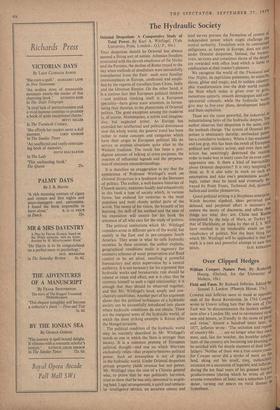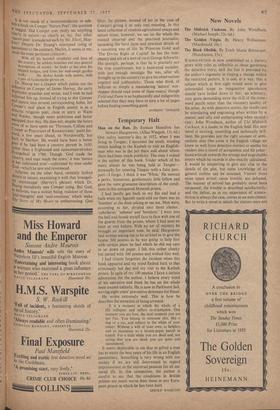Over Clipped Hedges
COWPER and Jefferies seem to stand at opposite ends of the Rural Revolution. In 1784 Cowper wrote to LJnwin telling him that the aim of The Task was 'to discountenance the modern enthus- iasm after a London life, and to recommend rural ease and leisure, as friendly to the cause of piety and virtue.' Almost a hundred years later, in 1877, Jefferies wrote : 'The seclusion and repose of country life . . . are no longer what they once were, and, like the weather, the humbler inhabi- tants of the country are becoming too knowing to be satisfied with the simple manners of their fore- fathers.' Neither of them was a true countryman' for Cowper never did a stroke of work on the land, eking out his small, cosy, melancholY existence on a succession of legacies; and Jefferies' during the ten final years of his greatest literary productiveness (during which he wrote all that anyone remembers of him), was a suburban Lon- doner, turning out essays on rural themes in Sydenham. It is not much of a recommendation to sub- title a book on Cowper 'Nature Poet'; the question is begged. Did Cowper ever really see anything clearly in nature—as clearly as, say, that other nature poet' (considered such by Mr. Eliot), Hop- kins? Despite Dr. Huang's attempted citing of quotations to the contrary, Hazlitt, it seems to me, made the most pertinent criticism : With all his boasted simplicity and love of the country, he seldom launches out into general descriptions of nature : he. looks at her over his clipped hedges, and from his well-swept garden Walks. . . He shakes hands with nature, with a Pair of fashionable gloves on. Huang has a chapter which points out the influence on Cowper of James Hervey, the early Methodist preacher and writer, and 1 wish he had followed this up, instead of trying to slot Cowper and nature into several corresponding holes; for dCowper's real place in English poetry is as a didactic religious poet, close in spirit to Watts and Wesley, though more ambitious and better equipped then they. He does not, despite the hours ,,,s°111c of us have spent on 'Thomson, Collins and Cowper as Precursors of Romanticism,' point for- ward, a few years ahead, to Wordsworth, but back to Herbert. He would have been a better Poet if he had been a country parson in 1630, rather than a frightened and conscience-stricken Evangelical in 1780. Though 'God made the Fountry, and man made the town,' it was 'nature In her cultivated trinf—cultivated by man under God--which he saw and reverenced. Jefl'eries, on the other hand, certainly looked closely at nature, examining it with that 'evangeli- ,al microscope' (Hervey's phrase) which Dr. 7°11°8 mistakenly sees Cowper using. But God, to Jefferies, was a mistier being, redolent of those ,soul-thoughts' and 'soul-emotions' which make Tile Story of My Heart so embarrassing. God blurs the picture, instead of (as in the case of Cowper) giving it its only real meaning. In this latest collection of random agricultural essays and nature notes, however, we see on the whole the trained observer and the practised journalist, recording the hard facts and practical details of a vanishing way of life. In 'Primrose Gold' and 'The Divine Right of Capital' he has the tren- chancy and wit of a sort of rural George Schwartz. His strength, perhaps, is that he is precisely not the true countryman, but a keen-eyed outsider, with just enough nostalgia (he was, after all, brought up in the country) to give his observations urgency and authenticity. Those who think of Jefferies as simply a maundering 'nature' wor- shipper should read some of these essays; though Field and Farm is so haphazardly and indigestibly selected that they may have to turn a lot of pages before finding something good.
ANTHONY TH WAITE

































 Previous page
Previous page